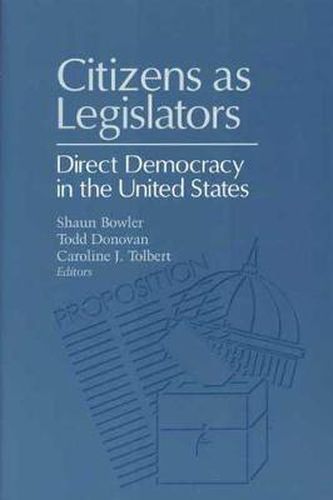Readings Newsletter
Become a Readings Member to make your shopping experience even easier.
Sign in or sign up for free!
You’re not far away from qualifying for FREE standard shipping within Australia
You’ve qualified for FREE standard shipping within Australia
The cart is loading…






This title is printed to order. This book may have been self-published. If so, we cannot guarantee the quality of the content. In the main most books will have gone through the editing process however some may not. We therefore suggest that you be aware of this before ordering this book. If in doubt check either the author or publisher’s details as we are unable to accept any returns unless they are faulty. Please contact us if you have any questions.
Early in the twentieth century, many American states began experimenting with direct democracy. Direct democracy-primarily the initiative device-allows groups to place directly before voters laws affecting taxation, spending, term limits, school choice, gay rights, immigration, and numerous other state issues. Ballot initiatives were expected to allow citizens the option of getting around legislators, who were seen as beholden to wealthy interests; early defenders of the process argued it would make state politics more responsive to the public will, and more responsible. Citizens as Legislators examines direct democracy in America at the end of the twentieth century to see if it has lived up to these expectations. The twelve contributors to this volume use the American experience with direct democracy to investigate some fundamental questions of politics: Can modern democracy have direct citizen participation in legislation? What are the consequences of more (or less) direct citizen access to government? The authors look at the context of the initiative campaigns and detail the rise of the modern initiative campaign industry. They examine how campaigns affect voters and how voters deal with the array of decisions they face in direct democracy states. They go on to explain why certain policy outcomes are different in direct democracy states. Shaun Bowler is a professor of political science at the University of California, Riverside. Todd Donovan is a professor of Political Science at Western Washington University. He and Shaun Bowler are coauthors of Demanding Choices: Opinion, Voting, and Direct Democracy. Caroline J. Tolbert is an assistant professor of political science at Kent State University.
$9.00 standard shipping within Australia
FREE standard shipping within Australia for orders over $100.00
Express & International shipping calculated at checkout
This title is printed to order. This book may have been self-published. If so, we cannot guarantee the quality of the content. In the main most books will have gone through the editing process however some may not. We therefore suggest that you be aware of this before ordering this book. If in doubt check either the author or publisher’s details as we are unable to accept any returns unless they are faulty. Please contact us if you have any questions.
Early in the twentieth century, many American states began experimenting with direct democracy. Direct democracy-primarily the initiative device-allows groups to place directly before voters laws affecting taxation, spending, term limits, school choice, gay rights, immigration, and numerous other state issues. Ballot initiatives were expected to allow citizens the option of getting around legislators, who were seen as beholden to wealthy interests; early defenders of the process argued it would make state politics more responsive to the public will, and more responsible. Citizens as Legislators examines direct democracy in America at the end of the twentieth century to see if it has lived up to these expectations. The twelve contributors to this volume use the American experience with direct democracy to investigate some fundamental questions of politics: Can modern democracy have direct citizen participation in legislation? What are the consequences of more (or less) direct citizen access to government? The authors look at the context of the initiative campaigns and detail the rise of the modern initiative campaign industry. They examine how campaigns affect voters and how voters deal with the array of decisions they face in direct democracy states. They go on to explain why certain policy outcomes are different in direct democracy states. Shaun Bowler is a professor of political science at the University of California, Riverside. Todd Donovan is a professor of Political Science at Western Washington University. He and Shaun Bowler are coauthors of Demanding Choices: Opinion, Voting, and Direct Democracy. Caroline J. Tolbert is an assistant professor of political science at Kent State University.